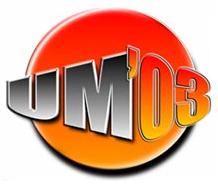
3rd Workshop on Affective and Attitude User Modeling
Assessing and Adapting to User Attitudes and Affect:
Why, When and How?
in conjunction with User Modeling 2003
June 22, 2003


|
3rd Workshop on Affective and Attitude User Modeling Assessing and Adapting to User Attitudes and Affect:
|

|
|
Call For PapersBackground and Motivation:User modeling has traditionally focused on what is generally considered ‘cognitive’ and ‘rational’ aspects of user behavior; typically the user’s knowledge and belief state. While useful, models focusing strictly on these aspects of user state often miss critical components of user mental state and behavior: affective states (e.g., basic affect such as like/dislike reactions; emotions such as frustration, fear, happiness, anger, etc.; moods), and attitudes (e.g. trust, doubt, etc.). These factors have also been referred to as ‘extrarational’ and shown to strongly influence both reasoning and communication. Over the past 5 years much progress has been made in a number of areas relevant to the assessment and modeling of these factors. This third workshop addressing affective and attitude user modeling issues follows the first and second workshops, held in Banff, BC, 1999 and Sonthofen, Germany (2001) .As before, the main goal is to provide an opportunity for a focused exchange of ideas about this emerging subfield of user modeling. To this end, this 3rd one day workshop will address a variety of issues related to assessing user attitudes, affective states, and personality traits. The overall aim will be to explore core issues regarding the assessment, modeling, and adaptation to these states, across a range of applications (e.g., decision support systems, training and tutoring, telehealth and VR applications). These issues will include the following:
Suggested Topics and Specific Questions to Be Addressed:The workshop aims to address both theoretical and methodological issues, and applied issues in this broad research area. Examples of specific topics of interest include the core issues outlined above, and the following:1: Methods for effective recognition of user emotional states and attitudes, with particular emphasis on multi-modal techniques. 2: Methods for modeling user emotional states and attitudes. 3: Methods and techniques for displaying and visualizing user emotional states and attitudes, and the use of these visualizations to promote interactive, iterative and accurate identification of these states in real-time. 4: Criteria for determining when user emotions and attitudes should be modeled and how this information should be used to enhance HCI. 5: Approaches
to validating emotion and attitude in user models and their effectiveness
in HCI. 1: Taxonomy
of Circumstances Requiring Affective and Attitude User Modeling
2: Existing
methods of Constructing Affective/Attitude User Models
3: Validation
and Evaluation 4: Guidelines
for model use Workshop Format:The exact workshop format and structure will be determined based on the submitted contributions. However, we will aim to provide a mix of interaction formats to stimulate discussion among participants, and to accommodate the presentation of both novel work-in-progress and more established state-of-the-art ideas and methods. To this end, the workshop will include a mix of the following:
Breakout sessions and presentation of session summaries to the entire workshop audience. (These sessions may be organized around the key questions listed above) Poster and demo sessions Keynote speaker One moderated panel discussion, with active encouragement of audience participation Concluding moderated panel discussion focusing on the key questions Submission details and Contact Information:The workshop organizers wellcome submissions of high-quality papers describing completed or on-going research addressing theories, methods, techniques and results in user emotion and attitude modeling. Both papers and posters may be submitted. Submission of interactive demonstrations is particularly encouraged.All submissions should include an abstract, list of keywords and full author contact information. All submissions must be in English. Papers should not exceed 2000 words (excluding figures and tables). Authors should use the APA style of citations, two-column format and a font no smaller than 10 points. Submissions should be made in PDF or postscript formats. Submissions should be sent electronically to evahud@earthlink.net and conati@cs.ubc.ca by March 10, 2003 |